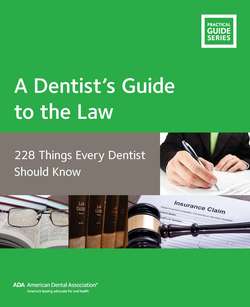Читать книгу A Dentist’s Guide to the Law - American Dental Association - Страница 80
На сайте Литреса книга снята с продажи.
Telephone Sales Rule and the National Do-Not-Call Registry
ОглавлениеThe Federal Trade Commission established the National Do-Not-Call Registry (DNC Registry) under the federal Telephone Sales Rule (TSR). Consumers may add their phone numbers to the DNC Registry to limit the telemarketing calls they receive. Indeed, dentists and members of the dental team may have added their telephone numbers to the DNC Registry to limit telemarketing calls.
It appears unlikely that a dental practice’s routine appointment reminder calls to patients who have existing appointments would be deemed in violation of the TSR. However, it is conceivable that TSR issues could come up if a dental practice implemented a telephone campaign that could be construed as being for the purpose of selling goods or services, or soliciting consumers, particularly if the campaign included individuals who do not have an “existing business relationship” (as defined in the TSR) with the dental practice.
There are two kinds of “established business relationships” under the TSR:
One is based on the consumer’s purchase, rental, or lease of the seller’s goods or services, or a financial transaction between the consumer and seller, within 18 months preceding a telemarketing call. The 18-month period runs from the date of the last payment, transaction, or shipment between the consumer and the seller. The other is based on a consumer’s inquiry or application regarding a seller’s goods or services, and exists for three months starting from the date the consumer makes the inquiry or application. For more information, please see Exemptions to the National Do Not Call Registry Provisions section of Complying with the Telemarketing Sales Rule.8
Note that this definition of an “established business relationship” may exclude certain individuals who may be a dental practice’s “patients of record.”
If the TSR applies, the dental practice must take a number of steps before a telephone call is made. For example, the dental practice must check to make sure that the number is not on the DNC Registry. The dental practice must also maintain its own do-not-call list and add any consumer who has asked not to receive any more calls from or on behalf of the dental practice. Calling a consumer who has asked not to be called potentially exposes a dental practice to a civil penalty. Even if a call is to a telephone number that is not on the DNC Registry or the dental practice’s own do-not-call list, additional requirements apply. For example, the caller must provide certain material information to the consumer.
TSR violations can result in civil penalties of up to $16,000 per violation, and violators may also be required to pay redress to injured consumers.
Moreover, whether or not a call is permissible under the TSR, it must comply with other applicable laws, such as the Federal Communication Commission’s regulations under the Telephone Consumer Protection Act and the Privacy Rule of the Health Insurance Portability and Accountability Act of 1996 (HIPAA).
A qualified attorney can provide information about how these laws apply to a proposed telephone campaign.
